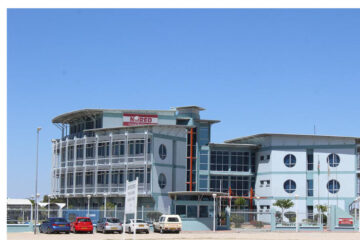Niël Terblanché
Swakopmund has recently made strides towards addressing its critical housing shortage through a new agreement signed with the National Housing Enterprise (NHE).
The innovative plan was revealed last week and aims to build 805 affordable homes within the DRC informal settlement, offering approximately 22 000 residents who currently live in shacks the hope of owning a house.
Dina Namubes, the mayor of Swakopmund, while revealing the new plan, pointed to the acute need for housing solutions.
Namubes indicated that the project will prioritise vulnerable groups, including the disabled, elderly, security personnel, media practitioners, and street vendors.
“This initiative isn’t just about building houses. It is about creating homes for those who need them the most and lifting our community out of the burden of poverty,” she stated.
She said that the homes, when eventually built, will be priced between N$90 000 and N$200 000, and that they are designed to be financially accessible.
Namubes said that the project involves collaboration with small and medium enterprise developers and housing groups such as the Shack Dwellers Federation of Namibia and Build Together.
The town council has already allocated 80 plots to the Build Together group, allowing them to construct and complete their homes with supportive loans.
Namubes stated that she and the other council members are committed to making sure that land management and housing provisions result in real benefits for the community.
Benedict Louw, a land use expert, called for more aggressive action in constructing houses and urged local councillors to leverage their political influence to effectively address land issues.
Louw criticised the tendency to reserve land for non-residents and highlighted the role of inflated housing prices in exacerbating the housing crisis.
“This is about more than politics; it’s about ensuring that every citizen of Swakopmund has a roof over their head,” he said.
He also emphasised the harsh reality facing many low-income families, and he questioned the affordability of the proposed housing prices for the most vulnerable members of the country’s population.
The municipality is optimistic about the housing project’s timeline, expecting construction to start as soon as the National Housing Enterprise (NHE) secures financing.
According to Louw, a performance agreement requires each house to be completed within two to three weeks.
“This rapid turnaround time reflects the urgency of the housing crisis in Swakopmund,” he said.
He added that by the end of 2024, Swakopmund expects to welcome residents into an additional 214 single-family homes from Quintessential Trading Consultancy and 119 from the NHE, further demonstrating the town’s commitment to resolving its housing shortage.




